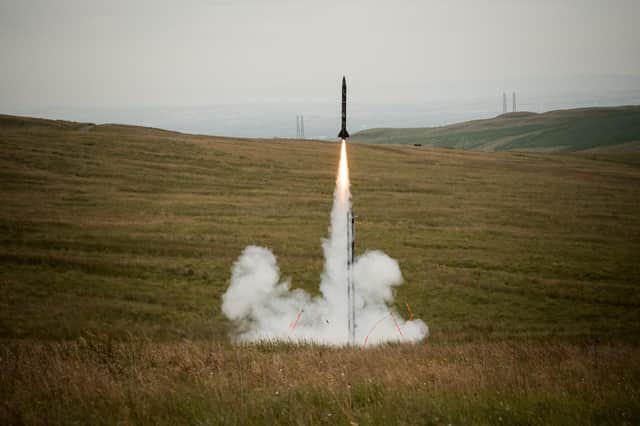
Rocket fired from Ayrshire moor in a bid to make space more green
A rocket with a breakthrough environmentally-friendly design was fired from a windy moor in Ayrshire yesterday in a test flight to prepare it for space.
Spectators gathered at the Scottish Aeronautics and Rocketry Association's base at Fairlie Moor, just south of Largs, Ayrshire, for the launch of the rocket Nebula, built by a team from Imperial College London.
The launch was put back several hours as final checks were made on the rocket, which has been designed to cut down on “space junk” and be re-used following a space-bound voyage.
The test flight, which was set to take the rocket to 16,000 feet, took place in preparation for its ultimate journey beyond the Karman Line – the internationally recognised boundary to space which sits at roughly 100km above sea level.

If successful, the Imperial team will be the first student group to pass the space boundary with a reusable rocket.
Aeronautical Engineering student Shapol M, Shakil Perera, Tian Fang and Mohammad Kapadia
designed the rocket after setting up their Karman Space Programme last year.
Shapol said: "This diverse, ambitious and unique group of students are making space more
accessible and sustainable, and want to show what is possible for the future.”
The rocket was launched just before 7pm after delays to the original launch time pushed
back permission from air traffic control teams at Prestwick Airport.
The team will build and launch a series of prototypes over the next two years, aiming at
different altitudes and helping them refine their design before building up to the space
launch in 2024.
At Fairlie, the recovery and avionics systems of the nine-metre high rocket were tested
with the team successfully (??) concluding the rocket was reusable.
Helen Sharman, Britain’s first astronaut and UK Outreach Ambassador at Imperial said: “A
huge factor in making rockets eco-friendly is the manufacture of the rocket itself.
“With a reusable design, the Karman Space Programme students are stretching rocket
technology to deliver positive benefits to our lives with minimal negative impact on the
Earth, making this a really worthwhile student project.”